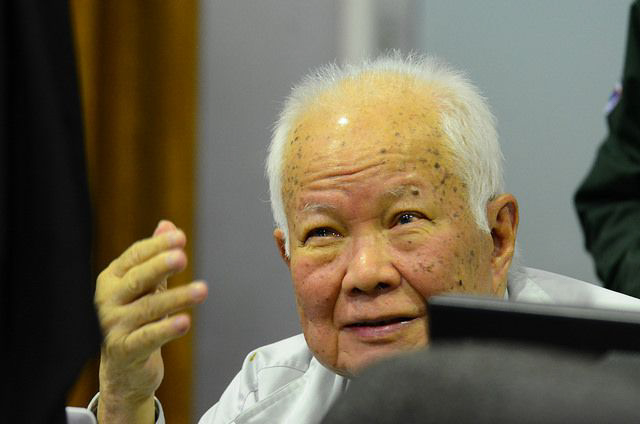
Former Khmer Rouge head of state Khieu Samphan, attends a Case 002/02 hearing earlier this month. ECCC
Former Khmer Rouge leader Khieu Samphan’s final words at the Khmer Rouge tribunal on Friday were peppered with admissions and excuses, but he made no apology for the regime’s 1.7 million victims. Samphan chose to deny and justify, while his co-accused, former Brother Number Two Nuon Chea, opted for silence.
“The Communist Party of Kampuchea leaders did not exterminate our people,” Samphan said, thrusting his finger to drive home his point. “I know that they really suffered,” he said, referring to the civil parties, who are victims of the regime represented in the courtroom.
“I also heard when they spoke to me, sometimes referring to me as a ‘murderer’ . . . But the term ‘murderer’, I categorically reject it.”
Throughout the second phase of his trial, known as Case 002/02, Samphan, 85, and Chea, 90, have mostly stuck to their right to remain silent.
While there was the occasional outburst about the aggression of the “expansionist” Vietnamese, the imploring questions of 63 tearful civil parties echoed off the walls, unanswered.
In contrast, Kaing Guek Eav, better known by the alias Duch, who ran the Khmer Rouge’s notorious S-21 torture prison, at times displayed contrition and engaged with the questions put to him by his victims, giving written responses in some cases.
In one such response, Duch, the first person convicted by the tribunal, wrote to two civil parties to apologise that he had mistakenly rejected their claim that their relative was imprisoned at S-21.
Duch acknowledged their relative “must have suffered inhumane hardship”, and said “I do not seek any excuse to exonerate myself”.
Samphan, in contrast, sought to justify the hardship of those allegedly enslaved in cooperatives, denied any knowledge of forced marriage or the slaughter of minorities, and said “self-genocide” was a figment created by Vietnamese propaganda.
“I will not say more about things that I did not know, because so far everything I have said in my attempt to understand the tragic events of my country is held against me in order to conclude my responsibility,” Samphan said, licking a finger to turn the page.
“I do not doubt [life was hard in cooperatives]. However, those who consider themselves in senior positions believed that they had the right to accuse and had the right to punish other people.
“Our country was emerging from an unprecedented crisis. All areas in our countryside had been pounded by American bombs,” he said, adding there was an “urgency” to rebuild and defend the country, and “the only force we had was the strength of people”.
Nuon Chea declined to make any final comments before the court on Friday, with his lawyer Victor Koppe saying Chea decried the tribunal as a “deeply flawed and broken institution” and a product of “victor’s justice”.
“Nuon Chea couldn’t care less if you convict him again to a life sentence. He really doesn’t care, because, rightly so, he doesn’t take this institution seriously,” Koppe said.
“There was no rigorous or dispassionate analysis of the evidence, but just a show, as if this courtroom is some sort of circus.”
Koppe also appeared to compare Chea to former US President Barack Obama, by highlighting that treason, such as that of alleged subversive Ruos Nhim, was punishable by death almost anywhere in the world in the 1970s.
“Ruos Nhim was to Democratic Kampuchea what Osama Bin Laden was to the United States, but then 10 times more dangerous,” Koppe said.
“Did former United States President Barack Obama hesitate to have bin Laden executed? … No he didn’t, he just used different and more advanced means, like drones.
“And does anyone in the West have a problem with Obama’s extrajudicial killings? Not many people, I think.”
Koppe said he would not address “this ocean of misrepresentation of the evidence and this ocean of historical ignorance” of the prosecution, which on Thursday characterised Chea’s account of a country threatened by internal coups and Vietnamese espionage as “fake history”.
The prosecution last week argued Samphan, and especially Chea, were unrepentant. When Chea did express condolences to his victims, this was overshadowed by his excuses, prosecutor Nicholas Koumjian said on Thursday.
“Those are crocodile tears – absolutely insincere – because as he has said, he makes no apology for S-21,” the Khmer Rouge torture centre, he said. He pointed out Chea laughed when he said he “didn’t jot it down” after he realised Cambodian people were being tortured and killed.
While Chea had no final words, he did have a final wish: for the defence team’s 550-page closing brief – in which he espoused the “theory of the crocodile” to explain the historical context surrounding the regime – be translated into Khmer as soon as possible and distributed widely, saying he believed “the Cambodian public will understand”.
“Cambodian history has now finally been re-written,” Koppe said. “And it is for the Cambodian public to decide if it accepts this new history, yes or no.”
No date has yet been set for the final judgement, but it could take up to a year, with initial projections estimating a verdict to be handed down in the second quarter of 2018.
Contact PhnomPenh Post for full article
Post Media Co LtdThe Elements Condominium, Level 7
Hun Sen Boulevard
Phum Tuol Roka III
Sangkat Chak Angre Krom, Khan Meanchey
12353 Phnom Penh
Cambodia
Telegram: 092 555 741
Email: [email protected]










